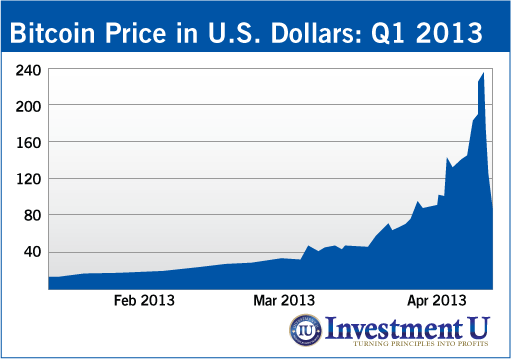In 2009 Satoshi Nakamoto invented a new electronic or virtual currency called Bitcoin, the design goal of which is to provide an equivalent of cash on the Internet.1 Rather than using banks or credit cards to buy stuff online, a Bitcoin user will install a piece of software, the Bitcoin client, on her computer and send Bitcoin directly to other users under a pseudonym.2 One simply enters into the software the pseudonym of the person one wishes to send Bitcoin and the amount to send and the transaction will be transmitted through a peer-to-peer network.3
What specifically one can get with Bitcoin is somewhat limited to the few hundred websites which accept them, but includes other currencies, web hosting, server hosting, web design, DVDs, coffee in some coffee shops, and classified adverts, as well as the ability to use online gambling sites despite being a US citizen and to donate to Wikileaks.4 However, what allowed Bitcoin to break into the mainstream – if only for a short period of time – is the Craigslist-style website “Silk Road” which allows anyone to trade Bitcoin for prohibited drugs.5
On February 11th, 1 BTC exchanged for 5.85 USD. So far 8.31M BTC were issued, 0.3 Million BTC were used in 8,600 transactions in the last 24 hours and about 800 Bitcoin clients were connected to the network. Thus, it is not only some idea or proposal of a new payment system but an idea put into practice, although its volume is still somewhat short of the New York Stock Exchange.
The three features of cash which Bitcoin tries to emulate are anonymity, directness and lack of transaction costs, all of which are wanting in the dominant way of going about e-commerce using credit or debit cards or bank transfers. It is purely peer-to-peer just like cash is peer-to-peer. So far, so general.
But what makes the project so ambitious is its attempt to provide a new currency. Bitcoin are not a way to move Euros, Pounds or Dollars around, they are meant as a new money in itself; they are denominated as BTC not GBP. In fact, Bitcoin are even meant as a money based on different principles than modern credit monies. Most prominently, there is no “trusted third party”, no central bank in the Bitcoin economy and there is a limited supply of 21 million ever. As a result, Bitcoin appeals to libertarians who appreciate the free market but are sceptical of the state and in particular state intervention in the market.
Because Bitcoin attempts to accomplish something well-known – money – using a different approach, it allows for a fresh perspective of this ordinary thing, money. Since the Bitcoin project chose to avoid a trusted third-party in its construction, it needs to solve several ‘technical’ problems or issues to make it viable as money. Hence, it points to the social requirements and properties which money has to have.
In the first part of this text we want to both explain how Bitcoin works using as little technical jargon as possible and also show what Bitcoin teaches about a society where free and equal exchange is the dominant form of economic interaction. In the second part we then want to criticise Bitcoin’s implicit position on credit money. From this also follows a critique of central tenets of the libertarian ideology.
The first thing one can learn from Bitcoin is that the characterisation of the free market economy by the (libertarian) Bitcoin adherents (and most other people) is incorrect; namely, that exchange implies:
Mutual benefit, cooperation and harmony.
Indeed, at first sight, an economy based on free and equal exchange might seem like a rather harmonious endeavour. People produce stuff in a division of labour such that both the coffee producer and the shoemaker get both shoes and coffee; and this coffee and those shoes reach their consumers by ways of money. The activity of producers is to their mutual benefit or even to the benefit of all members of society. In the words of one Bitcoin partisan:
“If we’re both self-interested rational creatures and if I offer you my X for your Y and you accept the trade then, necessarily, I value your Y more than my X and you value my X more than your Y. By voluntarily trading we each come away with something we find more valuable, at that time, than what we originally had. We are both better off. That’s not exploitative. That’s cooperative.”6
In fact, it is consensus in the economic mainstream that cooperation requires money and the Bitcoin community does not deviate from this position: “A community is defined by the cooperation of its participants, and efficient cooperation requires a medium of exchange (money) …”7 Hence, with their perspective on markets, the Bitcoin community agrees with the consensus among modern economists: free and equal exchange is cooperation and money is a means to facilitate mutual accommodation. They paint an idyllic picture of the ‘free market’ whose ills should be attributed to misguided state intervention and sometimes misguided interventions of banks and their monopolies. - Read more here:
http://gegen-kapital-und-nation.org/en/bitcoin-finally-fair-money






